IJCRR - 9(9), May, 2017
Pages: 26-31
Date of Publication: 15-May-2017
Print Article
Download XML Download PDF
Awareness and Need of Ethics and Values in Education for Students: A Study among College Teachers in Pollachi Region
Author: S. Shobana, R. Kanakarathinam
Category: Technology
Abstract:Ethics, Value education, Need of ethics, Awareness of ethicsIn today's goal driven society, youth are capable of generosity, solidarity and loyalty. They are less socially inferred and highly individualistic with their own ideas and values. They face numerous issues like unemployment, psychological instability, disruptive behaviour and numerous life problems. Code of ethics should be addressed to the youth by making awareness through education system. The good and bad cause on code of ethics should be addressed to the students to inculcate in their daily routine. Experts from academics and industries have stated that students should be trained and addressed regularly on their ethical behaviour and code of ethics thereby students will gain confidence to face all the situations in their life .It also gives a meaning and role for their activities which is performed by them. Teachers with a high level of moral professionalism have a deep obligation to help students learn and behave ethically which supports the students to have a sustained growth in their life. The major benefits of ethical students are they will be highly committed, taking responsibility, giving respect , high tolerance, non-discrimination, compassion, better understanding and good citizen. Hence, this paper attempts to analyse the need and awareness of the value education for students by the perception of the teachers in Pollachi region.
Keywords: Ethics, Value education, Need of ethics, Awareness of ethics
Full Text:
Introduction
Ethics is being interrupted differently in different situation. It is a standard of behavior that tell us how human beings ought to act in the many situations in which they find themselves-as friends, parents, children, citizens, businesspeople, teachers, professionals. Students being the part of the society and tomorrow’s nation’s builders, ethics should be inculcated among the students through educational framework. The teachers should orient all students to analyse and understand what is “good” and what is “bad” or what is “wrong” and what is “right” or what to do and what not to do with reference to day-to-day commitments. Commonly ethics is perceived as judging others, family values, outcomes, legal rights, or specialists in solving personal problems but ethics actually mean two aspect. The Most essential character to be present in a human is the ability to discern right from wrong, good from evil and propriety from impropriety and the commitment to do what is right, good and proper. Ethics is not just a topic to mull or debate, it entails action.
Focusing on essentials of Ethics and Values
The rapid changes in the technological world have posed many challenges in the global era. In this globalized mechanical commercial world, expecting the future generation with honesty and commitment is a night mare for the society. Today all the children have an immense power of observation and their feelings are deep-rooted. They always observe their parents at home and their teachers in school. They are highly sensitive. It is right time where parental care to the children is on the wane. Today media play a vital role in the life of children , the adverse effect on the media has made the Children to accept a unrealistic approach in all the sphere of the life . In this context, there is now a growing demand in education to inculcate, nurture and develop values and ethics, particularly among the youth of the nation. Ethics lies at the core of the teaching profession. Tomorrow prospects of our country depend upon the moral values imparted to students during their college life. The role that teachers are expected to play in the lives of their students has undergone significant change in recent years. (Beavis, 2004)1 has stated that teachers are expected to be moral guides. This paper aims to report the awareness and need of ethics and values in education which supports to frame their inner behavior. Exist
REVIEW OF LITERATURE
- ‘Rauni Rosonen’(2007)2 has found that society of individuals are widely and deeply conscious of ethical questions and are studying them is the target and means of the ethical growth in teacher education.
- ‘William A.L. Anangisye, PhD (OCT 2010)3, the paper focuses on the initiatives and challenges of promoting ethics in teacher training colleges. The study has concluded that without a welldefined education policy in favour of promoting teacher ethics education, efforts to that effect are doomed to fail.
- Rukhsana Zia(2007)4, have focus on “quality of education” has sharpened as people have become concerned about a perceived rise in materialism as standards of living have improved;. This paper tries to delineate the global normative aims of education as a model for assessing the composition of the teacher education curriculum in Pakistan. The paper accepts that ethics and values education is still in a formative stage.
- Gunnel Colnerud (2006)5, research on teacher ethics and the moral dimensions of teaching has contributed to extensive and valuable knowledge, which has sometimes led to constructive syntheses of positions finally he found there is a relationship between moral education and professional ethics and what is morally significant in the teaching profession.
- (Gallagher, 2009, p.11)6. An increasing number of child research publications reflect on research practice and demonstrate the “problematic, messy and contested nature of ethical dilemmas”
Objectives of the study
- To find the factors influenced as ethical values among teachers.
- To know the perception of faculties for the need of ethic in education curriculum.
- To analyse the values that transform the character of the students
- To know the values that influence the balanced life in future
Research methodology
To obtain information needed to fulfill the objectives of the research study, questionnaire was drafted. This questionnaire was circulated among faculties in randomly chosen in different department of colleges in Pollachi region. 10 arts and Science College. Completely filled in 204 questionnaires were analyzed for analyzing the above said objectives.
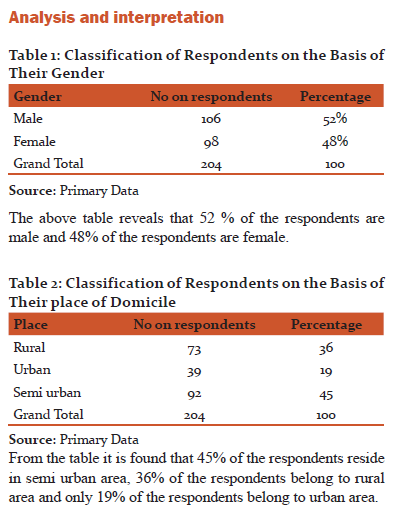
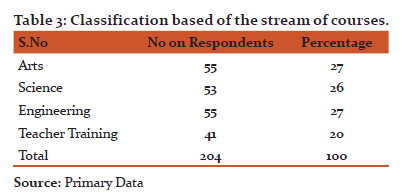
From the analysis it found that majority of the respondents 27% belong to both arts and engineering field, 26% of the respondents belong to science stream and 20% of the respondents belong to teacher training college.
TABLE 4
Average Rating of perception of ethical values
The ethical values varies based on the individual perception, it has a high relation between the ethics and the code of awareness. Teachers being the major role in transforming the students this analysis have been rated to know the perception of ethical values which is more essential for the students.
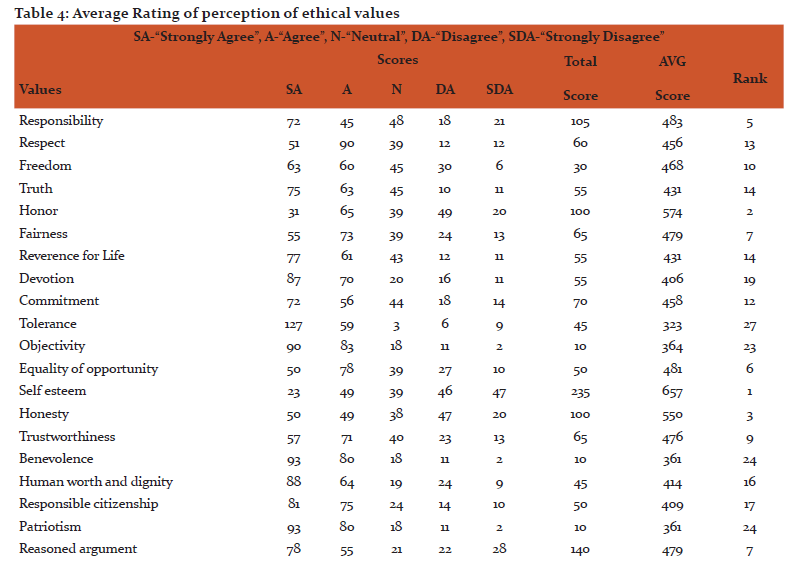

Perception of ethical values was analyzed based on the 27 factors, five point likert scale was used to rate the variable. Self esteem is most important factor which enforces one’s confidence level in performing all activities in better manner, it was occupied the top position and Tolerance level which reduce one negative character excelling out occupies the least rank. The ranking of the factors are given in the following rank: Self esteem, Honor, Honesty, Environmental friendly , Responsibility, Equality of opportunity, Reasoned argument, Fairness, Trustworthiness, Humility, Freedom, Commitment , Respect, Truth, Reverence for Life, Human worth and dignity, Responsible citizenship, Social Coherence, Kindness, Devotion, Compassion, Open-mindedness, Objectivity, Patriotism, Benevolence, Respect for other's rights, Tolerance.
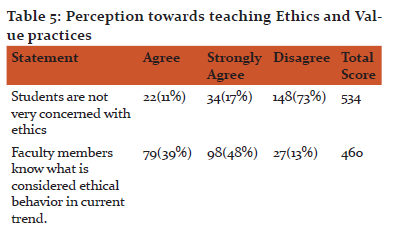
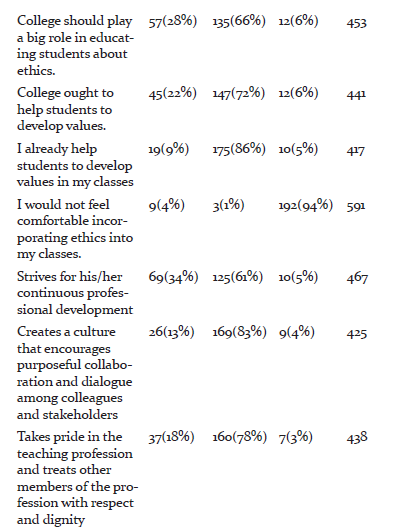
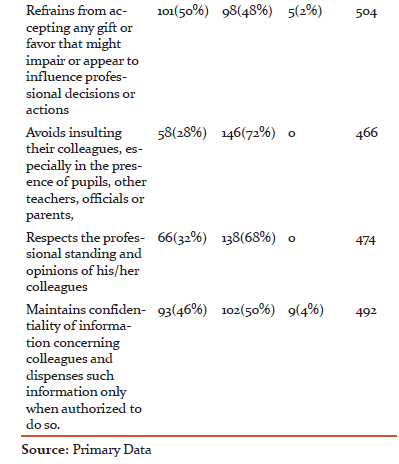
From the analysis, the teachers have opined that students are not concerned about ethics in their daily practices which is a sign of danger for the future, the teachers have revealed that, they refrain from accepting any gift or favor that might impair or appear to influence their professional decisions or actions in their career, which reflects teachers are ethically aware what to do and what not to do, it is high time to give awareness of ethics in their professional career which reduce the issues in the society also. Teachers are in the position to teach ethics in their daily routine class inhibiting where ever possible, which make awareness among students to sustain their behavior ethically sound.
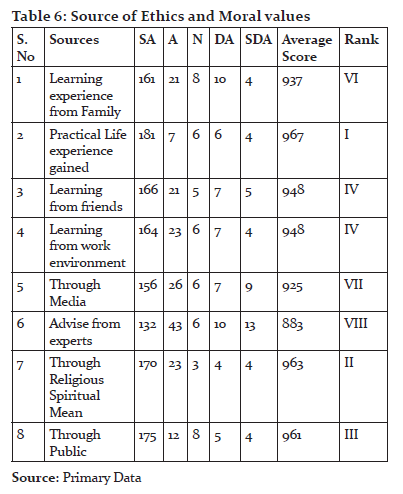
The above table reveals the source of ethical and moral values gained by teachers are through their routine practices, through spiritual means they learn ethical values, interaction with public and comments through public is also a media which educate the ethical and moral values among teachers, through their colleagues, higher official and sometimes students also gain the source of getting awareness on ethical practices, then occupies their family, experts in the academic area are also the source of getting aware of ethical practices.
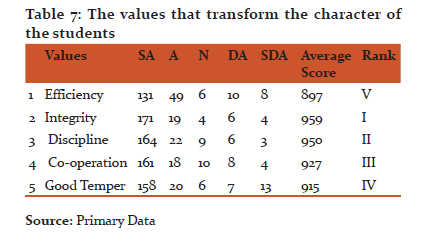
The opinion of the teachers is very much important in the role of student. According to the study the essential character that transform the values of the students was integrity which occupies the first position, it make the students to be honest in all their duties with commitment and responsibility, then occupies the discipline which transform the student to have self control in them, next occupies the cooperation , good temper and efficiency which improve the values of the students to perform based on the situation and need.
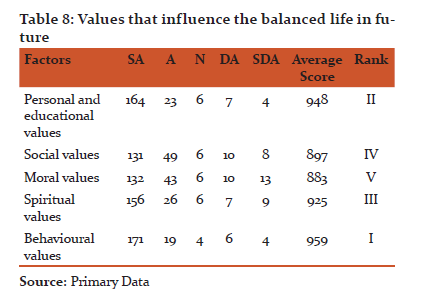
From the analysis, the respondents have revealed that students ‘behavioral values’ has highest influence in balancing their life in future, personal and educational values has the second priority and spiritual values , social values and moral values occupies the consecutive position.
FINDING
Findings in this study indicated that
- Majority of the respondents 52% are male and 48% of the respondents are female and mostly the respondents domicile area is semi urban and the teachers are equally distributed ranging from 20% to 30% in arts, science, engineering college and teachers training institute.
- Perception of ethical values was analyzed based on the 27 factors, with five point likert scale techniques where self esteem was rated as the most important factor which enforces one’s confidents level in performing the activities in better manner, it was occupied the top position. The ranking of the factors are given in the following sequence : Self-esteem, Honor, Honesty, Environmental friendly, Responsibility, Equality of opportunity, Reasoned argument, Fairness, Trustworthiness, Humility, Freedom, Commitment , Respect, Truth, Reverence for Life, Human worth and dignity, Responsible citizenship, Social Coherence, Kindness, Devotion, Compassion, Open-mindedness, Objectivity, Patriotism, Benevolence, Respect for other's rights, Tolerance.
- From the analysis, the teachers have opined that students are not concerned about ethics in their daily practices which is a sign of danger for the future, the teachers have revealed that, they refrain from accepting any gift or favor that might impair or appear to influence their professional decisions or actions in their career, which reflects teachers are ethically aware what to do and what not to do, it is high time to give awareness of ethics in their professional career which reduce the issues in the society also. Teachers are in the position to teach ethics in their daily routine class inhibiting where ever possible, which make awareness among students to sustain their behavior ethically sound.
- The above table reveals the source of ethical and moral values gained by teachers are through their routine practices, through spiritual means they learn ethical values, interaction with public and comments through public is also a media which educate the ethical and moral values among repondents, through their colleagues, higher official and sometimes students also gain the source of getting awareness on ethical practices, then occupies their family, experts in the academic area are also the source of getting aware of ethical practices.
- The opinion of the teachers is very much important in the role of student. According to the study the essential character that transform the values of the students was integrity which occupies the first position, it make the students to be honest in all their duties with commitment and responsibility, then occupies the discipline which transform the student to have self control in them, next occupies the cooperation, good temper and efficiency which improve the values of the students to perform based on the situation and need.
- From the analysis, the respondents have revealed that students ‘behavioral values’ has highest influence in balancing their life in future, personal and educational values has the second priority and spiritual values , social values and moral values occupies the consecutive position.
Suggestion
From the thought of Swami Vivekananda - “We must have life-building, man-making, character building-education.”
In the present digital era, there is wide opportunity to make awareness of the moral values and ethics values among students. It is high time to take necessary action to inculcate moral and ethical values in their curriculum and have a practice of formal and informal discussion on daily routine in all aspects from personal to career.
The following suggestions can be implemented
- Including moral and ethical values in their curriculum
- Providing value orientation in their curriculum than money orientation.
- Teaching through innovative methods to motivate them to get aware
- Conduction of programmes regularly stressing the values such as Personal Values, Social Values, Cultural Values, Spiritual Values, National values, Family values, Universal Values.
- Giving counseling to students based on their emotional behaviour.
- More community oriented activities should be arranged and social issues and their solutions should be addressed.
- Moral science subject should be introduced till higher education level.
- Teacher should be real initiator, inspirer and guiding person
- Should arrange training to inculcate the values in their regular practice, control emotions, to be compassion and lovable, taking responsibility etc.
Conclusion
The Radhakrishnan Commission (1948-49) highlighted the importance and the need to unite spiritual training in the curriculum of educational institutions. The Mudaliar Commission (1952-53) stressed that student’s character and the behavior would depend on religious and moral instruction. The Ramamurthy Committee (1990) reviewed that the essential quality of education is, it must develop a set of values like love , compassion, social order based on truth and nonviolence and integrating the science with spirituality.
Considering the fact that students spend a great part of their life with teachers and in turn teachers contribute significantly into overall 'quality of students lives’. There are numerous possibilities for teachers to influence the students to transform their attitude in good manner, and to feel that they can analyse their life style and behavioral attitude by understanding what is right, and deciding what they can commit for themselves and others, to create the kind of society they want to live in. In the light of the findings of the research, it is concluded that our faculty are aware of their responsibilities in shaping the moral and ethical values of student.
References:
- Beavis, Adrian (2004) "Why Parents Choose Public or Private Schools," Research Developments: Vol. 12 , Article 3.
- Rauni Rosonen’(2007) ,”‘The Ethical Nature of a Teacher's Work “,Business and Organization Ethics Network Vol. 2, No. 1.
- ‘William A.L. Anangisye, PhD (OCT 2010),” Promoting Teacher Ethics In Colleges Of Teacher Education In Tanzania: Practices And Challenges”, African Journal of Teachers Education Volume 1 No. 1.Pages 64 – 77.
- Rukhsana Zia(2007),“Values, Ethics and Teacher Education: A Perspective from Pakistan” Higher Education Management and Policy, vol. 19, issue 3, pages 20.
- Gunnel Colnerud (2006),” Teacher ethics as a research problem: syntheses achieved and new issues” Teachers and Teaching, Volume 12, Issue 3,pp 365-38
- Gallagher, M. (2009). Ethics. In E.K. Tisdall, J. Davis & M. Gallagher (Eds.), Researching with children and young people: Research design, method and analysis. London: Sage Publications
- Code of Professional Ethics for School Teachers, National Council for Teacher Education, Wing – II, Hans Bhawan, 1, Bahadur Shah Zafar Marg, New Delhi- 110002 December, 2010
- Roli Rai, Inculcation of Values: A Necessity Today. Int. J. Educat. Res. Technol. Vol 5 [1] March 2014. 30-32
-
- Australian Journal of Teacher Education ,Vol 33, 4, August 2008 1”Making The Implicit Explicit: Values And Morals In Queensland Teacher Education”-Amanda Mergler , Queensland University of Technology
- Indian Education System: What needs to change? Unlawyered, National University of Juridical Sciences. Available at: http://startup.nujs.edu/blog/indian-education-system-what-needs-to-change/ [Accessed May 16, 2015]
- Significance of Ethics in Education by Justice J.S. Verma, http://www.ugc.ac.in/page/Other-Publications.aspx /[ Accessed Dec ,2017]
- Concerns of Value Education: Role & Responsibilities of Educational Institutions,http://www.qcin.org/nbqp/qualityindia/vol-2-no2/column.html/[ Nov 2011]
- Indian Education System Needs A Change, http://www.indigenousherald.com/index.php/education/97-values-education-and-humanrights-challenges-and-suggestions/[July 2015]
- History of education in the Indian subcontinent, https://en.wikipedia.org/wiki/History_of_education_in_the_Indian_subcontinent/ [Mar 2017]
|






 This work is licensed under a Creative Commons Attribution-NonCommercial 4.0 International License
This work is licensed under a Creative Commons Attribution-NonCommercial 4.0 International License